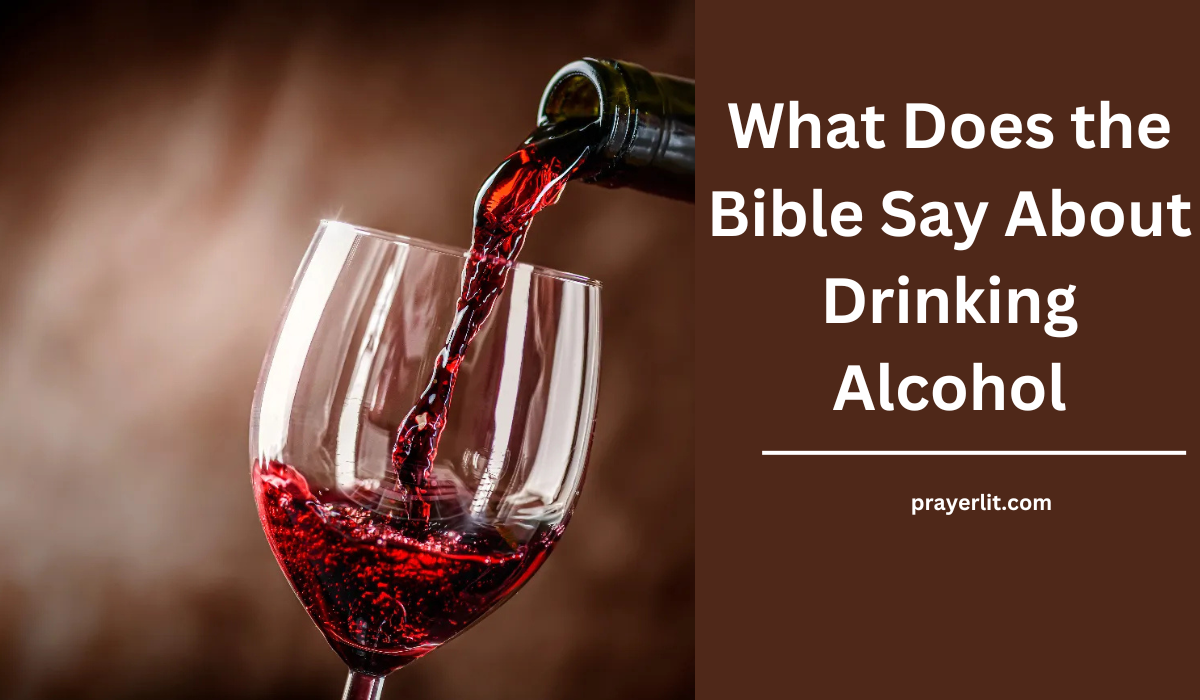Alcohol consumption is a subject of ongoing debate within Christian circles. Some believe it should be completely avoided, while others see moderate drinking as permissible. So, what does the Bible actually say about drinking alcohol? Does it condemn alcohol entirely, or is it more about how and why it’s consumed?

Receive Daily Prayers in Your Mailbox
Need help with prayers? Subscribe to receive daily prayers and devotionals.
In this article, we’ll explore the biblical perspective on alcohol, highlight key scriptures, and offer guidance for Christians seeking clarity.
Alcohol in the Bible: Historical and Cultural Context
Alcohol, particularly wine, played a significant role in ancient Jewish and early Christian cultures. Wine was a staple in daily life, used in meals, celebrations, religious rituals, and even as a medicinal aid.
Psalm 104:14–15 describes God as giving “wine that gladdens human hearts.”
Amos 9:14 references wine as a symbol of blessing and prosperity.
In biblical times, wine was typically diluted and less potent than most modern alcoholic beverages.
Understanding this context helps us see that the Bible doesn’t treat wine as inherently evil—it’s the abuse of it that becomes problematic.
Is Drinking Alcohol a Sin According to the Bible?
One of the most important distinctions the Bible makes is between drinking and drunkenness.
Drinking in moderation is not labeled a sin.
Drunkenness, however, is repeatedly condemned.
Key Verses:
Ephesians 5:18 – “Do not get drunk on wine, which leads to debauchery. Instead, be filled with the Spirit.”
Proverbs 20:1 – “Wine is a mocker and beer a brawler; whoever is led astray by them is not wise.”
Galatians 5:21 – Drunkenness is listed among the “acts of the flesh” that prevent inheritance of God’s kingdom.
Bottom Line: The Bible doesn’t say that alcohol is a sin, but strongly warns against losing control, which leads to sin.
Examples of Alcohol Use in Scripture
The Bible offers several examples of people consuming wine in appropriate and spiritual contexts:
1. Jesus at the Wedding in Cana (John 2:1–11)
Jesus’ first miracle was turning water into wine. This shows that He didn’t avoid wine and even used it to bless others.
2. Paul’s Advice to Timothy (1 Timothy 5:23)
Paul encouraged Timothy to “use a little wine because of your stomach and your frequent illnesses.” This highlights wine’s medicinal use.
3. The Lord’s Supper (Luke 22:17–20)
Jesus used wine as a symbol of His blood in Communion. Wine is tied to deep spiritual symbolism in the Christian faith.
Biblical Warnings Against Drunkenness
Scripture is clear that while drinking is allowed, drunkenness is dangerous, disgraceful, and sinful.
Stories That Serve As Warnings:
Noah’s Drunkenness (Genesis 9:20–27) – After the flood, Noah became drunk and was dishonored by his son.
Lot and His Daughters (Genesis 19:30–38) – Alcohol played a role in immoral acts within his family.
Isaiah 5:11 – “Woe to those who rise early in the morning to run after their drinks…”
Drunkenness leads to poor decisions, vulnerability to temptation, and separation from God’s will.
Christian Liberty and Personal Conviction
The Apostle Paul emphasized Christian liberty—freedom to make personal choices in gray areas—while also stressing responsibility.
Romans 14:21 – “It is better not to eat meat or drink wine or to do anything else that will cause your brother or sister to fall.”
Christians are free to drink in moderation, but must be mindful of how it affects others.
For some, abstinence is wise—especially if drinking causes a weaker believer to stumble.
Should Christians Drink Alcohol Today?
Here are some key considerations for Christians deciding whether to drink:
1. Personal Conviction
Your conscience matters. If you feel uneasy, it’s okay to abstain.
2. Influence on Others
Could your drinking cause someone else to relapse or sin?
3. Legal and Cultural Boundaries
Always respect legal drinking ages and cultural sensitivities.
4. Past Addiction Struggles
If you’ve struggled with alcohol before, abstaining is wise and necessary.
5. Ministry Context
Some roles may call for complete abstinence as a testimony or example.
What About Church Leaders and Alcohol?
Scripture holds leaders to a higher standard.
1 Timothy 3:3 – Church overseers must be “not given to drunkenness.”
Titus 1:7 – Elders must not be “addicted to much wine.”
Though not prohibited from drinking, leaders are called to higher accountability, often choosing abstinence out of love and leadership.
What If a Christian Struggles with Alcoholism?
If you or someone you know struggles with alcohol, know this: there is hope in Christ.
Encouragement from Scripture:
1 Corinthians 10:13 – “God is faithful… He will not let you be tempted beyond what you can bear…”
Isaiah 41:10 – “Fear not, for I am with you… I will strengthen you and help you.”
Seek support through counseling, accountability, recovery programs, and prayer. God’s grace is bigger than any addiction.
If you’re an addict, you can say these powerful prayers to overcome alcohol addiction.
FAQs About Drinking and the Bible
1. Is drinking alcohol a sin in Christianity?
No, drinking is not a sin, but drunkenness is clearly condemned.
2. Did Jesus drink wine?
Yes, Jesus drank wine and even turned water into wine at a wedding.
3. Can Christians drink socially?
Yes, provided it’s done in moderation and does not cause others to stumble.
4. Is wine in the Bible the same as today’s alcohol?
Wine in biblical times was often diluted, but it was still fermented and capable of causing intoxication.
5. Should Christians avoid alcohol altogether?
It depends on personal conviction, spiritual maturity, and circumstances.
Conclusion
The Bible presents a balanced view of drinking. It does not forbid alcohol, but it strongly warns against drunkenness and its consequences. Christians are called to exercise wisdom, self-control, and love—considering how their choices affect their spiritual walk and the lives of others.
Whether you choose to drink or abstain, do it to the glory of God (1 Corinthians 10:31).
